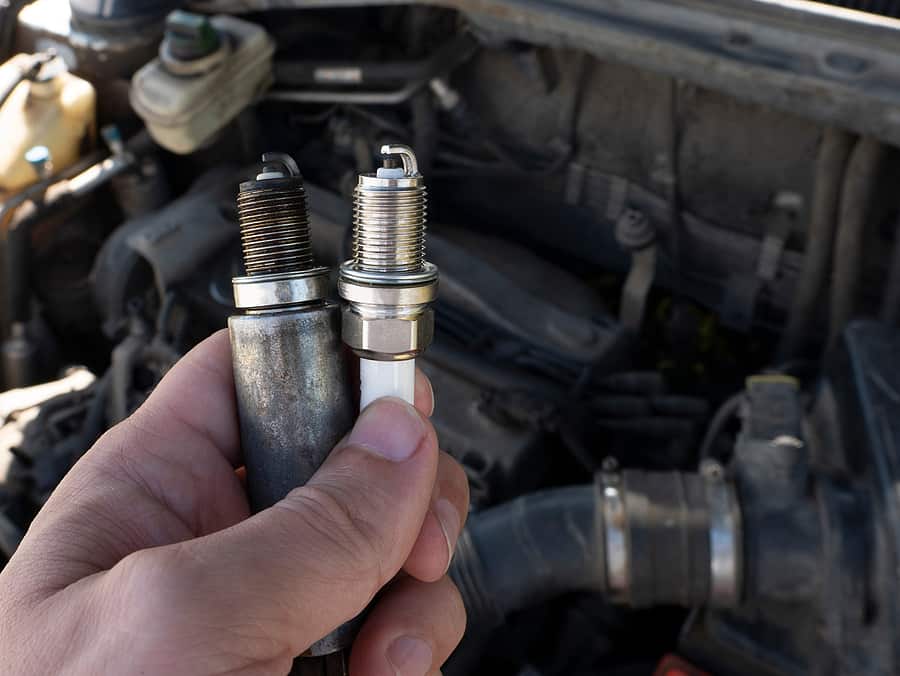Can You Drive a Car With Bad Spark Plugs?

Spark plugs play a critical role in your car’s engine. They are responsible for igniting the fuel-air mixture in the engine’s cylinders, enabling the engine to run smoothly. But what happens if one or more spark plugs go bad? Can you drive a car with bad spark plugs?
The short answer is yes, you can technically drive a car with bad spark plugs, but doing so is not recommended. Bad spark plugs can lead to several engine performance issues, and driving with them for too long can cause further damage to your engine. Let’s explore the impact of bad spark plugs and why it’s important to address the problem as soon as possible.
What Do Spark Plugs Do?
Spark plugs are small but mighty components of your vehicle’s ignition system. They create a spark that ignites the air-fuel mixture inside the engine’s cylinders, starting the combustion process. This spark allows the engine to power your vehicle.
A single spark plug is located in each of the engine’s cylinders. For cars with multiple cylinders, there are multiple spark plugs. Over time, these spark plugs wear down and can lose their effectiveness, which can lead to poor engine performance.
Symptoms of Bad Spark Plugs
If your spark plugs are bad, you may notice several symptoms. These can range from minor annoyances to more severe engine performance issues:
1. Engine Misfire
A common sign of bad spark plugs is engine misfires. A misfire occurs when the spark plug fails to ignite the fuel-air mixture, causing one or more cylinders to fail to fire properly. This can result in a rough idle, jerking, or a loss of power while driving.
2. Rough Idle
If you notice that your car is idling roughly or unevenly, bad spark plugs may be the culprit. When spark plugs aren’t firing correctly, the engine may struggle to maintain a smooth idle.
3. Poor Acceleration
Bad spark plugs can cause a delay or hesitation when you press the accelerator pedal. This occurs because the engine is not firing on all cylinders as efficiently as it should be, making acceleration sluggish.
4. Decreased Fuel Efficiency
Spark plugs that are worn out or damaged can cause your engine to misfire, leading to poor combustion. As a result, your vehicle may burn more fuel than normal, reducing overall fuel efficiency.
5. Check Engine Light
A faulty spark plug can trigger the check engine light to turn on. The car’s computer system detects an issue with the engine’s performance, such as misfires or improper combustion, and alerts you to check the engine.
6. Difficulty Starting the Car
In extreme cases, bad spark plugs can make it difficult to start your car, especially on cold mornings. The spark plugs may not be able to provide the necessary spark to ignite the fuel, causing the engine to struggle to start.
7. Increased Exhaust Emissions
Worn-out spark plugs can cause incomplete combustion, resulting in higher emissions. This can lead to your car failing an emissions test, and it may also cause your vehicle to produce more exhaust smoke than usual.
Can You Drive a Car With Bad Spark Plugs?
While it’s technically possible to drive a car with bad spark plugs, it’s not advisable to do so for an extended period. Here’s why:
1. Reduced Engine Performance
Driving with bad spark plugs will likely lead to noticeable performance issues. You may experience a rough idle, poor acceleration, or even engine misfires. These issues can make driving your car frustrating, as the engine will not run as smoothly as it should.
2. Further Damage to the Engine
If bad spark plugs are left untreated, they can cause more serious engine problems. For example, continued engine misfires can cause damage to the catalytic converter, which can be an expensive repair. Additionally, incomplete combustion due to faulty spark plugs can lead to the buildup of carbon deposits in the engine, which may affect other engine components over time.
3. Poor Fuel Efficiency
Driving with worn spark plugs can also reduce your car’s fuel efficiency. Since the spark plugs are not firing properly, your engine may burn more fuel than necessary. This can add up over time, leading to higher fuel costs.
4. Stalling and Difficulty Starting
In some cases, bad spark plugs can cause the engine to stall, especially when idling or driving at low speeds. This can make it unsafe to drive, particularly in traffic. Additionally, as the spark plugs continue to degrade, your vehicle may have difficulty starting altogether.
5. Check Engine Light
If the check engine light comes on due to bad spark plugs, it could indicate a misfire or poor engine performance. While the car may still drive, ignoring the issue could lead to more serious damage, and you may risk voiding any warranties or not passing emissions tests.
What Happens if You Ignore Bad Spark Plugs?
Ignoring bad spark plugs may seem like an easy solution, but it can lead to much bigger problems in the long run. Over time, poor spark plug performance can cause the following issues:
- Catalytic Converter Damage: As mentioned, engine misfires due to bad spark plugs can damage the catalytic converter, which is a crucial component in your vehicle’s emission system.
- Increased Repair Costs: What starts as a relatively inexpensive fix can snowball into a much more costly repair if left unchecked.
- Vehicle Stalling or Breakdown: A car with faulty spark plugs may stall, leaving you stranded on the side of the road. A complete breakdown could occur, resulting in high towing fees and extensive repair costs.
Can You Replace Spark Plugs Yourself?
Replacing spark plugs is a relatively simple maintenance task that many car owners can do themselves, provided they have the proper tools and know-how. However, if you are unsure how to do this or if you don’t have the right tools, it’s best to take your car to a mechanic. Replacing spark plugs generally involves:
- Removing the spark plug wires (or ignition coils, depending on the car).
- Using a spark plug socket to remove the old spark plugs.
- Installing the new spark plugs and properly gapping them (if necessary).
If you are not comfortable performing this task, a mechanic can replace the spark plugs for you at a reasonable cost.
Conclusion
In conclusion, while it’s possible to drive with bad spark plugs, doing so is not advisable. The symptoms associated with bad spark plugs, such as engine misfires, rough idle, and poor acceleration, can significantly affect your car’s performance. Additionally, ignoring the issue can lead to further damage to the engine and other components, such as the catalytic converter.
If you suspect your spark plugs are bad, it’s best to address the issue sooner rather than later. Replacing spark plugs is an affordable and straightforward repair that can improve engine performance, fuel efficiency, and prevent more serious damage in the future. So, don’t ignore bad spark plugs—get them fixed to keep your car running smoothly!





